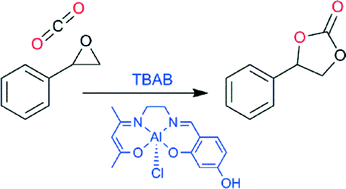 Reactions that utilize carbon dioxide are widely studied for their potential role in climate change mitigation. Symmetrical aluminium salen complexes are well known for their ability to catalyze reactions of carbon dioxide with epoxides, producing commercially valuable cyclic carbonates or polycarbonates. Aluminium complexes based on an unsymmetrical coordination environment, however, have not yet been explored for the cycloaddition reaction. This research represents the first catalyst study incorporating a hybrid salen-acetylacetonate ligand, using styrene oxide as a substrate.
Reactions that utilize carbon dioxide are widely studied for their potential role in climate change mitigation. Symmetrical aluminium salen complexes are well known for their ability to catalyze reactions of carbon dioxide with epoxides, producing commercially valuable cyclic carbonates or polycarbonates. Aluminium complexes based on an unsymmetrical coordination environment, however, have not yet been explored for the cycloaddition reaction. This research represents the first catalyst study incorporating a hybrid salen-acetylacetonate ligand, using styrene oxide as a substrate.
The University of Sheffield researchers discovered that the catalyst achieves 70% conversion to styrene carbonate at atmospheric pressure and elevated temperatures. When used in conjunction with tetrabutylammonium bromide (TBAB) in dichloromethane, this value reaches 90%. Moreover, TBAB alone catalyzes the reaction in yields comparable to the aluminium catalyst.
The full paper can be read here:
A single centre aluminium(III) catalyst and TBAB as an ionic organo-catalyst for the homogeneous catalytic synthesis of styrene carbonate
Somsak Supasitmongkol and Peter Styring
Catal. Sci. Technol. 2014, Advance Article, DOI: 10.1039/C3CY01015E
 Jenna Flogeras obtained her B.Sc. and M.Sc. in Chemistry from the University of New Brunswick (Fredericton), Canada. She is currently working towards her Ph.D. at Memorial University of Newfoundland, under the supervision of Dr. Francesca Kerton. Her research is focused on the synthesis of biodegradable polymers using main-group metal complexes as catalysts.
Jenna Flogeras obtained her B.Sc. and M.Sc. in Chemistry from the University of New Brunswick (Fredericton), Canada. She is currently working towards her Ph.D. at Memorial University of Newfoundland, under the supervision of Dr. Francesca Kerton. Her research is focused on the synthesis of biodegradable polymers using main-group metal complexes as catalysts.










